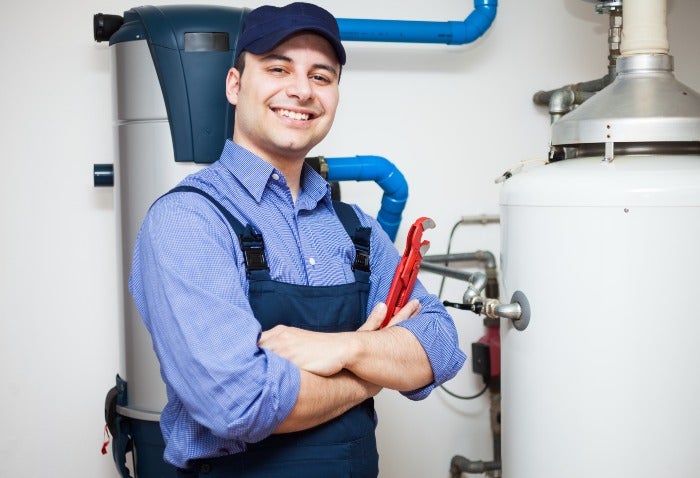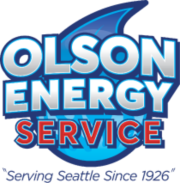-
Is Now the Time for a New Water Heater?
Introduction to Water Heater Choices in Seattle, WA
At Olson Energy Service, we pride ourselves on being Seattle’s trusted water heater experts. Living in Seattle, WA, means experiencing a mix of rainy, chilly, and sometimes unpredictable weather. This makes having a dependable water heater not just a luxury, but a necessity. Whether you’re in the early stages of considering a new water heater installation or are on the fence about replacing an old unit, our team is here to provide insights, expertise, and guidance.
Selecting the Right Water Heater for Seattle Homes

Choosing the ideal water heater for your home involves more than just picking a model. It’s about understanding your home’s unique requirements and ensuring you make an informed decision:
- Your Home’s Size and Needs – Different homes have varying hot water demands. Selecting a unit that can comfortably serve your entire household without straining is essential.
- Energy Efficiency – Modern water heaters are designed with energy conservation in mind. An energy-efficient model can significantly reduce your utility bills.
- Type of Water Heater – The market offers a range of water heaters, from traditional tank models to innovative tankless water heaters. Each type has its benefits and potential drawbacks.
Signs It’s Time to Replace Your Water Heater
Routine maintenance can extend your water heater’s life, but it won’t last forever like all appliances. Here are clear indicators that it might be time for a new unit:
- Frequent Leaks – Persistent leaks can signal internal issues or wear and tear.
- Age – If your water heater is approaching or has surpassed the 10–12-year mark, it’s time to consider a replacement.
- Consistent Breakdowns – If you’re calling for repairs more often than not, a new unit might be more cost-effective in the long run.
Average Lifespan of Water Heaters
Different water heaters have varying lifespans, largely influenced by their design and how they’re maintained:
- Conventional Tank Water Heaters – These units have an average lifespan of about 11 years. However, with regular maintenance, some can serve you for up to 15 years.
- Tankless Water Heaters – Known for their longevity, these can last up to 25 years when properly cared for. Their on-demand heating mechanism reduces wear and tear, contributing to their extended lifespan.
Installation Time for New Water Heaters
Installing a new water heater is a task best left to professionals. With Olson Energy Service, you can expect:
- Quick and Efficient Installation – Our team is trained to install water heaters efficiently, ensuring you’re not without hot water for long.
- Professional Guidance – We believe in keeping our clients informed. We’ll explain the installation process, answer any questions, and provide tips for maximizing your water heater’s performance.
Post-Installation Care for Your Water Heater
To ensure your water heater serves you well for years, post-installation care is crucial:
- Schedule Regular Maintenance – Like any other appliance, your water heater benefits from regular check-ups. This prolongs its life and ensures it operates at peak efficiency.
- Monitor for Any Issues – Be proactive. If you notice any irregularities, such as fluctuating water temperatures or unusual noises, it’s best to consult a professional.
- Consult Professionals for Repairs – DIY repairs can be tempting, but for the longevity of your unit and safety, always rely on expert water heater repair services.
Why Trust Olson Energy Service?
Olson Energy Service is your go-to solution if you’re in Seattle, WA, and have any water heater concerns. Whether it’s a new installation, a repair, or just some advice, our team is eager to assist. Reach out today and experience unparalleled service. Choosing Olson Energy Service means opting for quality, reliability, and expertise because of our:
- Decades of Experience – With years of serving the Seattle community, we’ve built a reputation for excellence.
- Expert Team – Our technicians undergo rigorous training to ensure they’re equipped to handle all water heater challenges.
- Commitment to Quality – It’s not just about fixing or installing water heaters; it’s about ensuring our clients are satisfied and their homes are comfortable.
-
Stopping Heat Loss in Your Home
If you’re like most Seattle homeowners, you want to prevent heat loss in your home—not only because it will make your home chilly, but also because you’ll end up spending more money to keep your household comfortable. Even when you turn up the thermostat, however, your home heating system may not be keeping you warm. Have you noticed that some parts of your home stay colder than others? As this video explains, the most likely culprit is inadequate insulation and poorly sealed windows and doors. When cold air seeps in from the outside, you can run the furnace for hours without being able to effectively warm some of the rooms in your house. To learn more about how to stop heat from escaping your home, watch the full clip.
-
What Homeowners Need to Know About Geothermal Heat Pumps
If you’re looking to keep your energy costs down in your household this year, you may want to think about installing a heat pump . Obtaining a home energy audit from an HVAC contractor in Seattle can help you determine whether this is a worthwhile investment for you. Geothermal heat pumps are a popular option for cold climates. If you’re interested in learning how these devices work, keep reading.
What are geothermal heat pumps?
A heat pump is a heating system that works by transferring heat out of one space and into another—for example, from the air outside your home to the air inside. Geothermal heat pumps work by transferring heat to or from an area a few feet under the ground, which stays at a steady temperature throughout the year. As with other heat pumps, these systems can be used to either heat or cool the air inside your home, and they can also be used to heat water.
What are the different types of geothermal heat pumps?
There are two distinct types of geothermal heat pumps used in homes: Closed loop and open loop systems. Open loop systems rely on groundwater to exchange heat, while closed loop systems can use either vertical or horizontal installations or rely on a nearby lake or pond for heat exchanges. When you talk to a contractor about installing your heat pump, he or she will inspect your property and advise you which option is best suited to your needs.
What are the advantages of geothermal heat pumps?
Since the temperature of the ground doesn’t change from one season to the next, geothermal heat pumps are much more efficient than heat pumps that rely on air. They are highly eco-friendly, since they don’t produce any emissions or have any noticeable impact on the environment. Geothermal heat pumps also require little maintenance once they’ve been installed, and they are quiet and unobtrusive.
““
-
Strategies for Improving Your Indoor Air Quality
Most people spend most of their time indoors, which means that the air they’re most exposed to is the air inside their homes. That means that the quality of your indoor air can have a significant impact on your life. Acting to improve your indoor air quality can make your Seattle home a safer and healthier place for you and your family. Here are some of the steps you can take to make your household air cleaner:
Invest in an Air Cleaner
Air cleaners—or air purifiers—are devices that are designed to remove contaminants such as dust and pollen from the air. If you can’t seem to keep allergens out of your home, an air cleaner may be a smart investment for you. It’s important to keep in mind, however, that air cleaners work best if you are already using other ways to minimize the number of pollutants in your household air.
Have Your Ducts Cleaned
If you don’t have them cleaned out from time to time, your HVAC system’s air ducts can harbor dust, pollen, mold, pet dander, dust mites, and other contaminants. When you run your furnace or air conditioner, these pollutants are spread throughout your entire home. If you suffer from allergies, this can make them worse. Having your ducts cleaned by a professional can help to ensure that your indoor air stays clean and breathable.
Call for Regular HVAC Service
When you use your furnace or air conditioner frequently, the various components of your HVAC system can get dirty and moldy—which will not only impact your air quality, but can also cause your system to break down. To reduce your need for repairs and maintain high-quality air inside your home, you should have your system inspected, cleaned, and serviced by an HVAC professional on a regular basis.
RECENT POSTS
categories
- Uncategorized
- Air Conditioner
- Fireplace Inserts
- Fireplace Insert Installation
- Air Conditioning Installations
- Air Conditioning Units
- Air Conditioner Maintenance
- HVAC Professionals
- Heat Pump Installation
- Heating and Cooling
- HVAC Unit
- Heat Pumps
- Furnace
- Furnace Service
- Tankless Water Heaters
- Water Heaters
- Energy Efficiency
- HVAC Contractors
- Olson Energy Service
- Mini-Split Systems
- Ductless Air Conditioner
